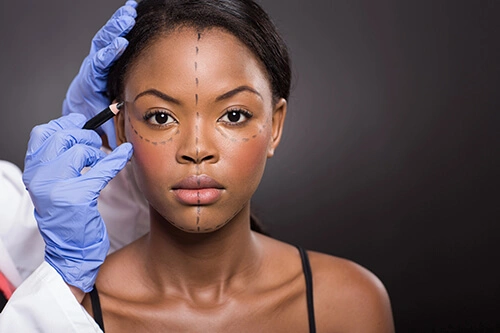Ending a marriage is akin to a swirling tornado of positive and negative emotions. Inevitably, there are doubts about who is to blame, what more could have been done, where it all went sideways, etc. Along with those concerns are insecurities about one’s physical appearance, especially when infidelity is the cause of the separation. Some people choose to have enhancement surgeries such as breast augmentation, facelifts, or liposuction to feel more confident as they begin the next stage of their life. Depending on many factors, the cost of their transformation may or may not fall on the side of marital property and shared household debts in the event of a divorce in New Jersey.
How Cosmetic Surgery Costs can Complicate Divorce in New Jersey
Untangling Cosmetic Surgery Costs in New Jersey Divorce Settlements
New Jersey is one of many states that divides shared assets and debts based on equitable distribution. This process involves identifying each asset as marital or separate, assigning a value to it, and distributing it fairly. Contrary to popular misconception, this does not necessarily mean an equal division. For the purposes of divorce, marital property is the earnings and assets acquired during the marriage that must be equitably distributed among the spouses. Divorce also requires division of debts taken on during the marriage, such as mortgages, car loans, and other major expenditures paid for with marital income. Separate property can include assets or a business owned before the marriage that remains in the sole custody of the spouse who owns them, the proceeds of a pension that matured before the marriage, or an inheritance. Separate assets become marital ones when they are combined with marital assets.
Although no case law provides a definitive answer regarding the value of cosmetic surgery, the courts are called to decide on a case-by-case basis the value of cosmetic enhancements and whether they are considered marital or separate property. The court considers many factors, such as the length of the marriage, each spouse’s formal education and training, income, and financial contributions to the marriage. Equitable distribution considers the separate and marital assets, the potential income of both parties and their shared debts. For that reason, allocating the cost of cosmetic surgery can be challenging. For example, perhaps the wife had a breast augmentation two years into the marriage. When she and her spouse divorced four years later, the loan used to pay for the surgery was considered a shared debt. On the other hand, let’s say a woman sold her car shortly before getting married and used the funds to pay for her breast enhancement surgery after the honeymoon. Because the money was hers alone, it was a separate asset.
Splitting Assets, Not Aesthetics in Cosmetic Surgery in Divorce Cases
The courts struggle with the fact that although cosmetic surgery can produce tangible results, it is not property to be inherited or sold—these are human beings and human body parts. The debt incurred because of the surgery can be distributed between the parties, but how much of the debt should be shared remains a conundrum that can only be resolved by careful analysis.
The Effect of Cosmetic Surgery Timing on NJ Divorce Outcomes
Getting cosmetic surgery during or after the divorce with marital funds can be trouble. If the surgery is done without the other spouse’s consent, in bad faith, the court could label the expenditure a dissipation of assets. The spouse who received the surgery could be held responsible for paying for it entirely because it would be considered an unfair division of assets. Courts evaluate if an expenditure is reasonable based on timing, need, and consent. Let’s take a look at a couple that has been married for two decades. The wife caught the husband stepping out on her and immediately filed for divorce. Her next stop was to a plastic surgeon for some “revenge” surgery to show him what he would be missing once the divorce was over. The trouble with her decision is the money she used for the surgery was spent in anticipation of a split. For this reason, the husband could claim in court that this was a clear example of dissipation of assets (purposeful wasteful spending), and she could be obligated to take on that debt.
Claims for Repayment for Cosmetic Surgery Changes During the Marriage if the Spouses Get a Divorce
Here is one common question that arises when one spouse gets plastic surgery during the marriage and the other tries to claim that they should be paid back or given more of the assets because the marriage is ending and they will no longer enjoy it. For instance, a couple has two small children. The husband suggested that his wife get a plastic surgery trifecta: a breast augmentation, tummy tuck, and BBL (Brazilian booty lift) as her body had changed after having children. This is often called a “Mommy Makeover.” Four years later, they divorced, and in the settlement, the man claimed that since they were no longer together, the surgery he had paid for would no longer benefit him, so he should receive compensation. This is not considered a valid point of contention in a divorce case, and therefore, he was denied.
Establishing How Cosmetic Surgery Costs are Allocated in a Prenup
A prenuptial agreement is the most effective way to protect assets and decide who pays for cosmetic surgical procedures. The agreement could specify that expenses for elective procedures are considered personal and not subject to reimbursement from marital funds. Contrarily, it can state that the marital assets can be used for the procedure when spouses are in agreement.
Potential Impact of Plastic Surgery on Alimony
Cosmetic surgery could influence alimony or spousal support determinations under specific circumstances. If the surgery was conducted to enhance the physical aspect of a spouse whose looks are a factor in their career (such as an actor, physical trainer, or model), the spouse could be credited with a higher income and receive less marital support. If it were an expense parallel to the standard of living of the married couple, it would probably not affect any decision. If the surgery had an unfortunate outcome or complications requiring further medical expenses, the injured spouse may require more alimony.
Key Cosmetic Surgery Considerations in Custody Disputes
It is a stretch for the courts to consider getting enhancement surgery as harming the children in the marriage. In cases where elective surgeries become an obsession, the court could question the parent’s priorities and mental stability if it becomes part of a pattern of priorities. If related health consequences affect a parent’s ability to care for their children, it may be taken into account during a custody decision.
Confused About Cosmetic Surgery Costs in Your Divorce Case in NJ? Contact Montanari Law Group for an Attorney’s Assistance

Cosmetic surgery before or during a divorce is just one example of how the equitable division of assets can be challenging. It is essential to have legal representation that is tailored to your needs. The divorce attorneys at the Montanari Law Group know that getting a divorce is an exhausting and stressful process. We can advise on all aspects of your divorce, such as alimony, equitable distribution of marital assets, and child custody. Our experienced family lawyers are talented, astute negotiators and litigators who will protect your rights and interests. We serve clients in Little Falls, Totowa, Paramus, Bergenfield, and elsewhere in Passaic, Hudson, Essex, and Bergen County, New Jersey. If you would like to know more about how we can apply our knowledge and experience handling New Jersey divorces to your unique situation, call us today at (973) 233-4396 or contact us online for a free consultation.

